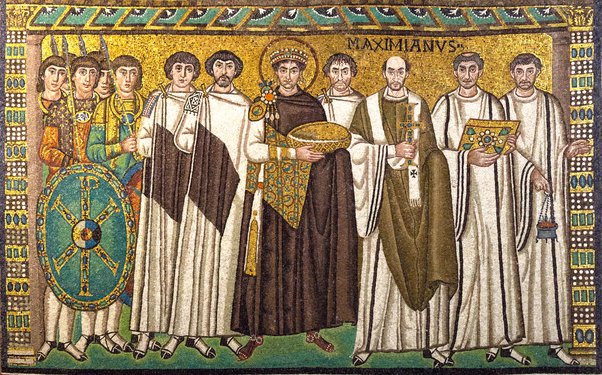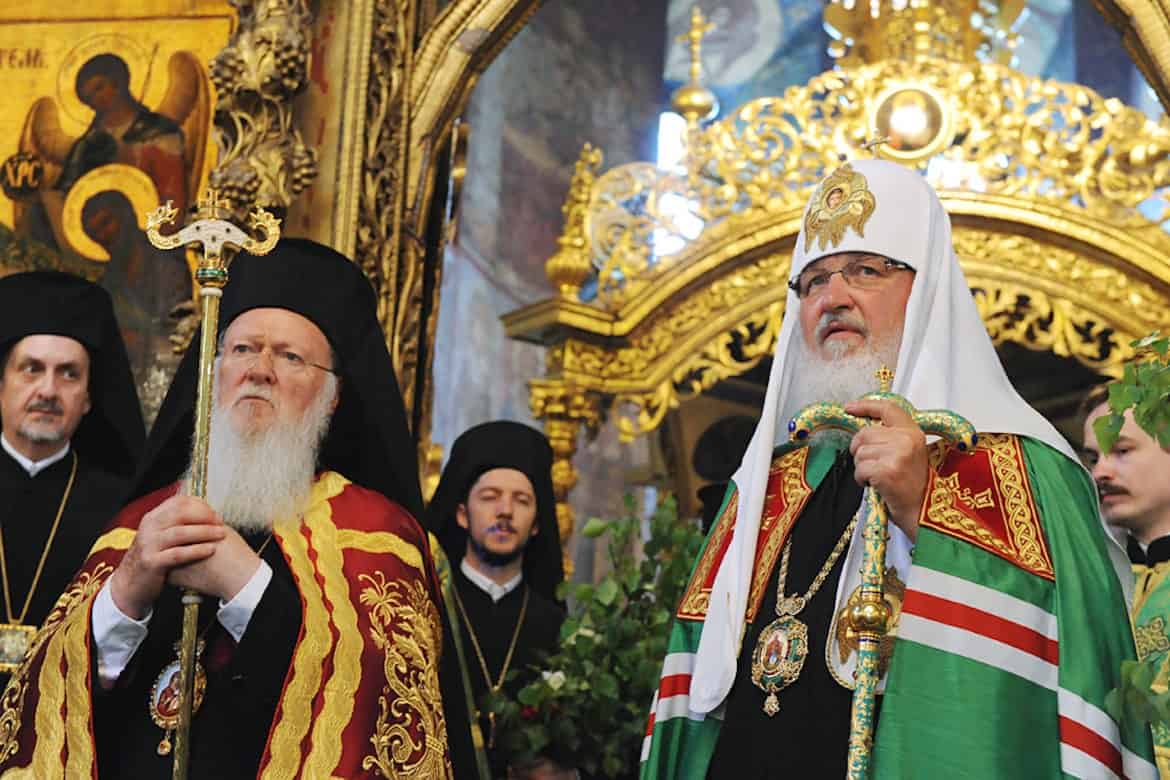
When Nikolai Fedorov was bold enough to state that “the dogma of the Trinity is our social program”, it was the first time that someone was explicitly drawing out the socio-political implications from Orthodox theological doctrine. In other words, it required a different environment altogether, i.e., the highly politicised milieu of modernity, in order to think of and by extension to interpret traditional doctrine in a non-traditional, yet quite pertinent and genuine manner. To be sure, this was not the first time that Orthodoxy – either practically and/or theoretically – was doing politics, but one could say that it was the first time that she was doing it radically.
Furthermore, since the 19th century Orthodoxy has been time and again challenged to confront its fundamental tension with the political, not only because in modernity the latter has taken over the authoritative place of religion but more importantly because Orthodoxy never gave up on the eschatological character of early Christianity. Of course, eschatology is one of the most misunderstood, mistreated and hence misleading realities of Christian experience. But it is upon this reality that the entire Kingdom of God hangs, and it is also from here that I will try to put forward what a modern Orthodox political theology could look like.

From the very beginning we need to set straight what eschatology does and what it does not refer to. The latter seems to be the easiest: the Orthodox Church cannot and should not take over the prerogatives of the political domain; the Orthodox Chruch cannot and should not be the crutch of politics; and, lastly, the Orthodox Church cannot and should not focus on solving everyday political problems. Well, what I mean is that it can … but in that case it does not do so as the Body of the Living Christ … Now identifying what eschatology actually refers to is something much more demanding, since from the earliest days of Christianity Christ-as-the-Eschaton has been interpreted in numerous ways – even in one and the same tradition.
Nevertheless, one could say the following: the Orthodox Church is utopian, that is, it is about a politics prior to, beyond and more than politics; the Orthodox Church is prophetic, that is, it critiques and challenges politics; and, lastly, the Orthodox Church is sacramental, that is, it constitutes an everyday alternative political hierophany. In what follows I will try to clarify these points through very specific examples from Church history, for a modern Orthodox political theology is conceivable and feasible only via the relevant witnesses of the past – witnesses that need, though, to become the focus of a radicalised intentionality.
If the Orthodox Church would become a politico-religious entity, then it would simply go against Christ, who said, “my Kingdom is not of this world” (John 18:36), and also the Spirit-inspired words of St Paul, according to whom “we have no lasting city here, but we are looking for the city that is to come” (Heb. 13:14). In other words, what is indirectly but unmistakably affirmed in these two Bible quotes is that there is a Kingdom and there is a city (a polis, whence politics)! But they are not conventional, worldly or human-based. If in turn the Orthodox Church were to strive for the cause(s) of politics, then it would certainly betray its Beloved Master who said: “No one can serve two masters. He will either hate one and love the other or be devoted to one and despise the other. You cannot serve God and mammon” (Matt. 6:24) – and everyone knows that mammon, i.e., the hierophanics of economy is the cherished space and means of politics. And, finally, if the Orthodox Church makes it her main business to fill in the social gaps that politics doesn’t want to or doesn’t manage to take care of, then – to be honest – it certainly would be very helpful but at the same time extremely boring …

By no means do the above entail that there is no Orthodox political vision. There is, and as I have already mentioned it is utopian, prophetic and sacramental. But this is a different and in many ways weird type of politics; different for it is “in the world” but not “of the world” (cf. John 17:13-16), and weird for it is manifest in the same unchangeable manner regardless of the success story or the failure of politics. More specifically, the utopian political vision of Orthodox theology speaks of, pursues and dreams of goals that are totally out of the visual field of conventional politics: it calls people to become “gods, children of the Most High” (Ps 82:6). This calling takes on a prophetic character, engaging not so much in the commending of whatever good things politics might achieve, as it is in being critical against the injustices that political agents and structures keep on perpetuating However, this radical criticism is not expressed through an anarchy of violence but through a violence of symbols. In particular, it intervenes and harasses the political status quo by embodying the aesthetics of the Age-to-Come, a World Order that is God’s gift and blessing to those who truly hunger and thirst for it (Matt. 5:6). And this is precisely the reason why the message, the task and the work of Jesus is being called the evangelion (literally, the good news).
When the Orthodox Church yields to the temptation of politics, she basically has three options: to become an integral part of the Establishment, to turn into an institutionalised State apparatus or to be utilised as a department of social services.
The first we have seen throughout the history of the Eastern Roman Empire (the so-called Byzantium), the second we are witnessing in the most gross way in the case of the modern Russian paradigm and the third has been the lot in many countries where Orthodoxy opts for social integration by all means … On the other hand, when the Orthodox Church goes for the politics of the Kingdom of Heaven, she basically is confronted with three challenges: to put forward a way of life that ultimately leads to martyrdom, to choose to “enter through the narrow gate” (Matt. 7:13) of poverty or to stay faithfully on the path of holiness.
The first challenge remains the unsurpassed way of the holy martyrs in their defiance against the absolutist claims of the State, the second has been realised time and again in the politeia of the ascetics and the fools for Christ, while the third constitutes the constant reminder to each and every one of us in the celebration of the Divine Liturgy.
There is a lot of talk in our time and age about radical Orthodoxy … and not without a reason, of course. We live in an environment that is under constant change and thus demands or seeks radical solutions to radical problems. What this means in terms of political theology is that whatever the relative endeavours of the past, they certainly are not enough nowadays. In the case of a modern Orthodox political theology, in particular, no one can be serious in espousing for instance Byzantine-inspired models, nation-imbued projects or agendas that are constructed to serve the ideal of social coherence. All this is simply not enough anymore!
The Orthodox Church must re-claim its radical eschatological calling and for that matter articulate a radical Orthodox political theology; a theology that will not pray for the head of State, will not confirm slavishly its allegiance to the government and will not have a paramount responsibility to society. The Orthodox political theology of the future should be able to constantly and relentlessly harass any political establishment in the name of humanity’s divine image of autonomy.
Modern Orthodox political theology should know one and only cry: Marana tha!

ABOUT | INSIGHTS INTO GLOBAL ORTHODOXY with Dr Vassilis Adrahtas
"Insights into Global Orthodoxy" is a weekly column that features opinion articles that on the one hand capture the pulse of global Orthodoxy from the perspective of local sensitivities, needs and/or limitations, and on the other hand delve into the local pragmatics and significance of Orthodoxy in light of global trends and prerogatives.
Dr Vassilis Adrahtas holds a PhD in Studies in Religion (USyd) and a PhD in the Sociology of Religion (Panteion. He has taught at several universities in Australia and overseas. Since 2015 he has been teaching ancient Greek Religion and Myth at the University of New South Wales and Islamic Studies at Western Sydney University. He has published ten books. He has extensive experience in the print media as editor-in-chief, and columnist, and for a while he worked as a radio producer. He lives in Sydney, Australia, his birthplace.

